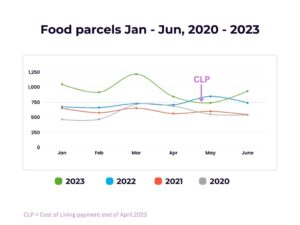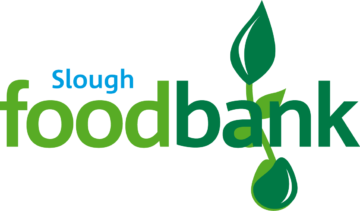Food poverty crisis at its highest as Slough Foodbank publishes statistics showing that more emergency food parcels were given out during the first 6 months of 2023 than ever before, with a 31% increase in the number of food parcels distributed versus same period in 2022.
6-month stats released – 01 January 2023 to 30 June 2023 versus the same period in 2022.
| 6 months 2023 Jan – June |
6 months 2022 Jan – June |
Percentage change | |
| Adults | 3,484 | 2,686 | 30% increase |
| Children | 2,226 | 1,686 | 32% increase |
| Total | 5,710 | 4,372 | 31% increase |
Breakdown by month 2023
| Month | Number of food parcels |
| January 2023 | 1050 |
| February 2023 | 917 |
| March 2023 | 1219 |
| April 2023 | 846 |
| May 2023 | 742 |
| June 2023 | 937 |
Graph showing number of food parcels by month Jan – June, from 2020 to 2023.

It’s a stark reality that year on year the increase in demand for Slough Foodbank continues – it’s not a trend that’s acceptable.
There was a 31% increase in the number of food parcels provided versus the same 6 months in 2022. It’s clear from these stats, that for many in Slough the cost of living crisis continues and families are being hit hard with a 32% increase in the number of children being fed.
Slough Foodbank Manager, Laura Cole commented:
“It is so disheartening to see first-hand the continuing need – we are seeing new faces every week, as more and more people are facing food poverty crisis and turning to us, often as a last resort. We are under real pressure to meet this demand both on supply of food, which we rely on donations for, as well as volunteers who sort food, prepare food parcels and serve clients.
We were hopeful that the cost of living payments would make a substantial difference and we can see that the payment at the end of April did help as the figures for May were the lowest in the 6 months. Sadly, this decrease was temporary – as demand in June reverted to higher levels. (We saw a similar pattern with the payments in July and November of 2022).
There is lots for us to do to ensure we can provide food during a time of crisis and continue to help raise the profile of food poverty and lobby for those who are in need. That’s why we are supporting the Trussell Trust’s campaign to ‘Guarantee our Essentials’ and that, at a minimum, Universal Credit should protect people from going without essentials such as food, household bills or travel costs.”
Slough Foodbank’s prime function is to supply a three-day emergency food parcel to those who suddenly find themselves in an unexpected crisis. In addition to food, we also supply basic toiletries and household products, as well as nappies, baby wipes and pet food if required.
We also provided 414 emergency fuel vouchers (an increase of 42%) for home gas or electricity for clients who qualify to receive food parcels, and who top up their meter at a pay point or a post office. This is to enable clients to cook the food we provide or heat their homes. The increase in fuel costs meant that many clients faced the tough decision over the winter months of whether to eat or heat their homes.
In addition to providing food, we try, by means of signposting and monitoring and discussions with the supporting referrer to give a helping hand through a crisis and help our clients make a positive move into the future. However, this is not long-term support nor a long-term solution, we need to see the government put a long-term solution in place.
If you would like to support Slough Foodbank please visit:
https://slough.foodbank.org.uk/give-help-2/
Notes:
Slough Foodbank has been providing emergency food parcels to people in food poverty crisis since 2010 and the area we support covers from Taplow in the West to Colnbrook in the East, and from Gerrards Cross, The Farnhams and Iver, to Datchet and parts of Windsor. We operate 6 days a week, out of 5 distributions centres in Slough (town centre), Langley, Cippenham, Iver and Britwell.
Our statistics are a measure of volume rather than unique users. The data is collected using an online system recording each food bank voucher and the number of emergency food supplies provided by adult and child.
For example, if a family of three were referred to Slough Foodbank twice in one year, this would count as six food parcels on the system because it would reflect six instances of a supply going to someone in the household. However, if a family of three were only referred to a Slough Foodbank once, this would count as three food parcels.
